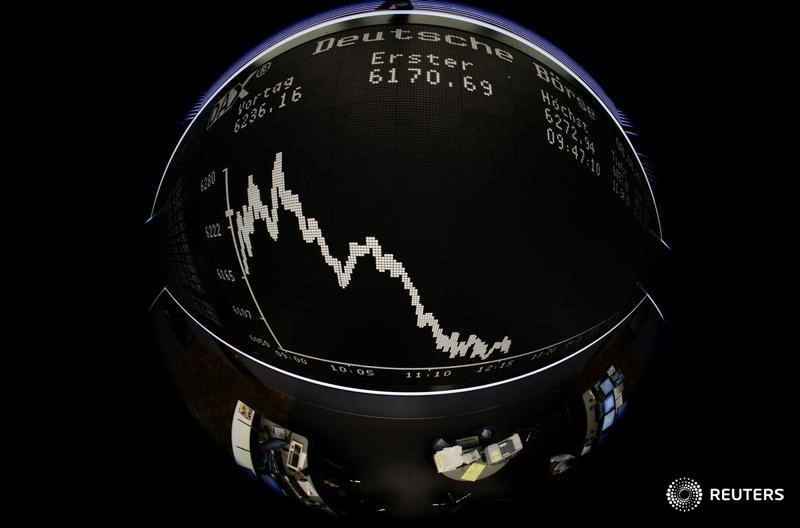Investing.com - European markets in the red on Friday - Ibex 35, CAC 40, DAX... - in a week of important macro data, and after the US CPI data.
"Economic growth in Europe is the lowest since 2011-2013, excluding the first few months of the pandemic, and a new energy crisis cannot be ruled out this winter. With Germany already in recession and its industry weakened, how long can investors ignore the bad signs?" asks Peter Garnry, head of equity strategy at Saxo Bank.
"Earnings in Europe have fallen for three quarters and the trend has been confirmed in the latest earnings season. Equity valuations have reached their biggest discount to US equity valuations since 2006, reflecting the fact that investors have never been so negative on Europe versus the US," he says.
Worst economic activity since the euro crisis years
As Garnry explains, "the European economy sharply contracted in September 2022 as high commodity prices (especially energy) dented consumer confidence and made industrial production unviable. Thanks to an extraordinarily lucky winter with above-average temperatures, Europe overcame its energy crisis. With the easing of commodity prices in 2023 and the strength of US consumption, economic activity in Europe picked up in January and February, before falling severely into negative territory in June."
"There was a small improvement in economic activity last month, but the estimated fall in GDP was 0.56% in the quarter and the 12-month moving average has fallen to -0.3%, the lowest level of activity, excluding the first few months of the pandemic, since the euro crisis years of 2011-2013," adds Garnry.
Valuations pose a dilemma for investors
"Slower economic growth in Europe has also impacted earnings: 12-month EBITDA peaked in Q3 2022 and has been declining ever since. This development, combined with enthusiasm for Artificial Intelligence (AI) technology, which benefits US tech stocks, has led European equities to their largest valuation discount (35% relative to 12-month expectations) to the US stock market since January 2006," warns the Saxo Bank strategist.
Another reality is the level of absolute valuation, according to Garnry. "European equities trade at a 12-month EV/EBITDA multiple of 8.7x, roughly 24% above the valuation levels investors were willing to pay for European equities in 2011-2013, when the continent was facing a currency and debt crisis and Europe was experiencing the same low levels of economic activity as today," he says.
"Investors can find value in European stocks, but there are risks: Germany's structural growth problems could hold the continent back; the energy crisis has not been resolved and could come back to haunt Europe for a couple more years; and there is a lack of fast-growing technology companies," he notes.
Will Germany solve its 'sick man of Europe' problems?
"Germany was often described in the foreign press as the 'sick man of Europe' during the 1990s and up to 2005, due to structurally higher unemployment and low growth resulting from unification. The expression has been revived recently after three consecutive quarters of negative or flat GDP growth and complaints from industry about poor industrial and energy policies," says Garnry.
According to Garnry, "China's integration into the world economy through its accession to the WTO in 2001 was a big change for Germany. To build the 'world factory', China needed a lot of advanced machinery and know-how, which German industry brought with it. On the other hand, Angela Merkel, Germany's chancellor from 2005 to 2021, pushed for a rapprochement with the Russian economy in the form of cheap energy that boosted Germany's industrial competitiveness vis-à-vis other European states".
"It follows that Germany will be the biggest loser in the fragmentation game in which the US and Europe are slowly disengaging from production and trade with China and Russia. Structural problems may not be as severe as in the 'sick man of Europe' days, but the failure to build a digital economy and the clustering of powerful tech companies, coupled with the biggest competitive shift in the auto industry in 70 years, expose the German economy to key risks," warns Garnry.
"A weak Germany is obviously a negative for European growth and investors betting on European equities should expect Berlin to wake up to the new era of geopolitics by realising that it must dramatically change its economic model and invest heavily in that change," he concludes.
(Translated from Spanish using DeepL)
